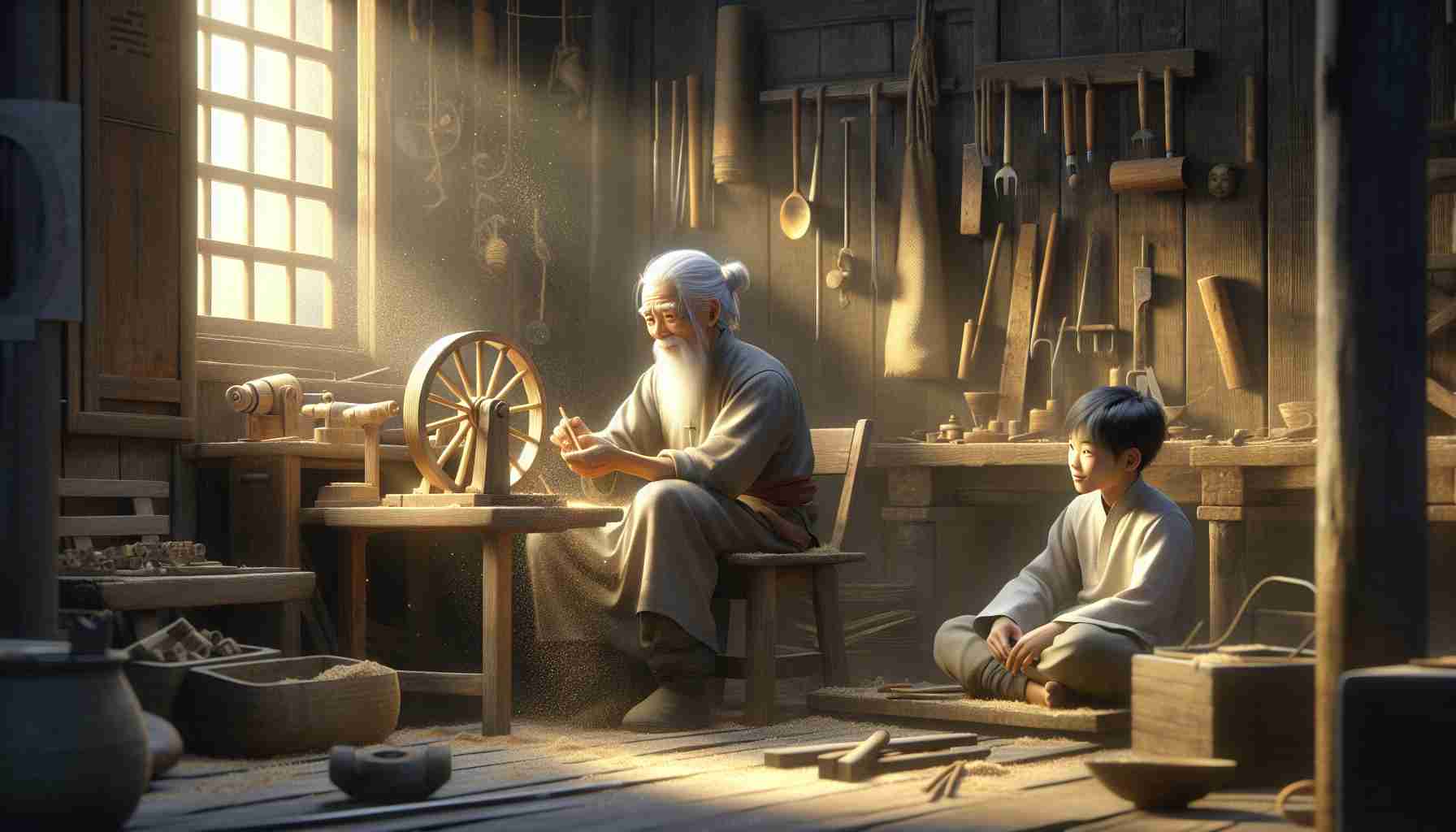

The wheel spun quickly as I watched my grandfather build another cart. I liked watching him work, though I never quite understood why he spent so much time carving the spaces between the wooden spokes. To me, the wheel was wood, and only wood. The holes weren’t important—they were just empty.
One crisp morning, I sat with him in the workshop. Grandpa’s hands were covered in sawdust, but they moved with such calm and care. I leaned in closer, puzzled.
“Grandpa,” I asked, “why do you leave those holes in the wheel? Couldn’t you make it stronger if it was all solid wood?”
He turned to me and wiped his hands. “Ah,” he said with a gentle smile. “This reminds me of something taught long ago by Laozi, the wise old man who wrote the Tao Te Ching in ancient China. He said, ‘Thirty spokes join in one hub. It is the space in the center that makes the wheel useful.’”
I blinked, not fully understanding. “But… it’s just empty space. What does it do?”
Grandpa held up one of the wheels. “Without the holes, the wheel wouldn’t spin. The space, though empty, is what makes it useful.”
I frowned. That didn’t sit right in my head, but I trusted my grandpa. I sat quietly the rest of the day, thinking about space and holes and usefulness.
That night, the sky was lit with stars, and my thoughts kept spinning like the wheel. I thought about our house and how if we filled every room with stuff, we wouldn’t be able to walk around. I thought of a bowl—how it’s made to hold things, but only because it’s hollow.
The next day, as Grandpa worked, I asked more. “So… is Laozi saying that nothing can sometimes be something?”
Grandpa laughed in a deep, quiet way. “Yes, little seedling. He believed that emptiness is not useless, but powerful. When we stop trying to fill every moment, we find peace. That’s called Wu Wei—doing without forcing. Like water flowing around rocks.”
I watched the river behind our house that evening. It didn’t push. It didn’t shout. It just flowed, moving around whatever was in its way. Still strong. Still sure.
Something in me shifted.
I began to understand that I didn’t need to always fill the silence or try to do everything. Sometimes, stepping back is the wisest step forward. Sometimes, the space in between is what gives shape to the whole.
As I lay in bed that night, I felt a quietness in my heart. Not an emptiness, but a calm.
I didn’t change overnight. But now, whenever I see a wheel, a bowl, or a quiet moment, I remember Laozi’s words. I try to leave space in my heart and day, knowing that in the simple and the quiet, true wisdom lives.
And that is how I began to follow the Way—the Tao—not by doing more, but by learning to be.
The wheel spun quickly as I watched my grandfather build another cart. I liked watching him work, though I never quite understood why he spent so much time carving the spaces between the wooden spokes. To me, the wheel was wood, and only wood. The holes weren’t important—they were just empty.
One crisp morning, I sat with him in the workshop. Grandpa’s hands were covered in sawdust, but they moved with such calm and care. I leaned in closer, puzzled.
“Grandpa,” I asked, “why do you leave those holes in the wheel? Couldn’t you make it stronger if it was all solid wood?”
He turned to me and wiped his hands. “Ah,” he said with a gentle smile. “This reminds me of something taught long ago by Laozi, the wise old man who wrote the Tao Te Ching in ancient China. He said, ‘Thirty spokes join in one hub. It is the space in the center that makes the wheel useful.’”
I blinked, not fully understanding. “But… it’s just empty space. What does it do?”
Grandpa held up one of the wheels. “Without the holes, the wheel wouldn’t spin. The space, though empty, is what makes it useful.”
I frowned. That didn’t sit right in my head, but I trusted my grandpa. I sat quietly the rest of the day, thinking about space and holes and usefulness.
That night, the sky was lit with stars, and my thoughts kept spinning like the wheel. I thought about our house and how if we filled every room with stuff, we wouldn’t be able to walk around. I thought of a bowl—how it’s made to hold things, but only because it’s hollow.
The next day, as Grandpa worked, I asked more. “So… is Laozi saying that nothing can sometimes be something?”
Grandpa laughed in a deep, quiet way. “Yes, little seedling. He believed that emptiness is not useless, but powerful. When we stop trying to fill every moment, we find peace. That’s called Wu Wei—doing without forcing. Like water flowing around rocks.”
I watched the river behind our house that evening. It didn’t push. It didn’t shout. It just flowed, moving around whatever was in its way. Still strong. Still sure.
Something in me shifted.
I began to understand that I didn’t need to always fill the silence or try to do everything. Sometimes, stepping back is the wisest step forward. Sometimes, the space in between is what gives shape to the whole.
As I lay in bed that night, I felt a quietness in my heart. Not an emptiness, but a calm.
I didn’t change overnight. But now, whenever I see a wheel, a bowl, or a quiet moment, I remember Laozi’s words. I try to leave space in my heart and day, knowing that in the simple and the quiet, true wisdom lives.
And that is how I began to follow the Way—the Tao—not by doing more, but by learning to be.